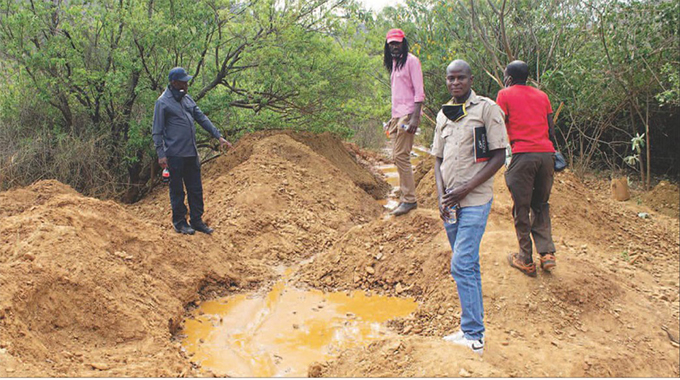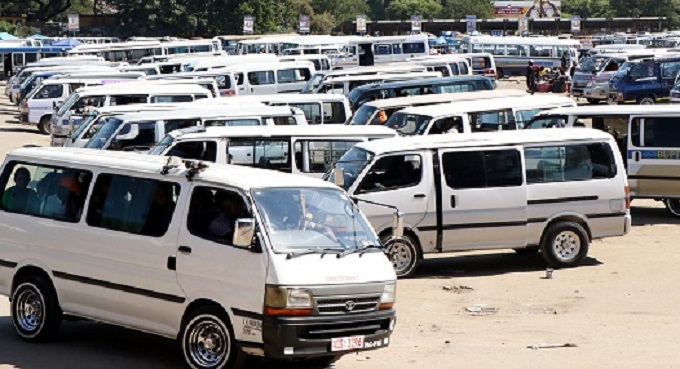Cyanide and mercury disaster looms in Shurugwi

Patrick Chitumba, Midlands Bureau Chief
A health hazard is looming in Shurugwi district where both humans and livestock are under threat as a result of illegal disposal of cyanide and mercury used by artisanal miners.
The district is witnessing an upsurge in cancer and tuberculosis cases attributed to cyanide and mercury which are also killing livestock.
Villagers have said they lost more than 100 cattle that have either been trapped in the muddy waters or fallen into open pits left by the artisanal miners.
The artisanal miners leave behind big yawning craters filled with stagnant mercury polluted waters, mounds of sand and fallen trees.
The district is now synonymous with dust-coated shrubs, residual mining pits, defaced roads and silted rivers and dams.
Communities and livestock are exposed to contaminated drinking water and the mining activities are also affecting pastures and irrigation schemes.
Various rudimentary methods of mining used by artisanal miners have led to deforestation and the siltation of rivers.
This was heard by members of the Parliamentary Portfolio Committee on Mines and Mining Development chaired by Shurugwi South MP Cde Edmond Mkaratigwa and Parliamentary Portfolio Committee on Lands, Agriculture and Rural Resettlement, chaired by Mberengwa North MP Cde Tafanana Zhou who attended a Women and Land in Zimbabwe meeting in Gweru yesterday.
The meeting followed a fact-finding mission by the two portfolio committees after Women and Land in Zimbabwe wrote a petition to Parliament demanding laws that protect farmers especially women farmers in Shurugwi affected by activities of artisanal miners.
Mr Dickson Nyamande, the chairperson of Selukwe farm- whose farming activities have been affected by uncontrolled artisanal mining, said he lost eight cattle that fell into craters left after mining activities.
He said fellow farmers and plot holders have lost more than 100 cattle adding that they were forced to use contaminated water from Mutevekwi River which he said was drying up due to siltation.
“We are not against mining but it should be done in a controlled manner so that we are not affected as farmers and our livestock. I have lost eight cattle which fell in craters left by these miners while as farmers from Selukwe farm, we lost more than 100 cattle. The situation is very bad,” said Mr Nyamande.
He said there was an increase in cases of villagers with skin diseases as well as TB.
“Villagers are in trouble, they are facing siltation of rivers, their health is being compromised and they are losing livestock. We need laws that protect us because we can’t all be miners,” he said.
Mr Peter Mukwena- a farmer at Edward Farm plot 6 in Shurugwi along Zvishavane Road said he lost two bulls.
“The craters are all over and no one claims ownership and as such you can’t demand compensation. The Government must enforce rules and regulations in artisanal mining. Farms have boundaries but it seems these miners don’t respect people’s land. We are not saying they must stop mining but they should ensue their activities do not adversely affect others and they have a responsibility to also protect the environment for future generations. Gardens along Matimba River in my area have been affected because the river is drying up,” he said.
Cde Mkaratigwa said there was indeed conflict between farmers and artisanal miners which he said was being addressed through the crafting of the land policy.
“Our main focus here was on conducting an inquiry with regards to a petition we received from Woman and Land in Zimbabwe on behalf of communities that are involved in farming.
“We confirmed that there is conflict in terms of farming and mining activities that are taking place in the areas as alluded to by the petitioners. There is an eyesore because of environmental damage created by mining activities,” he said.
Cde Mkaratigwa said it is President Mnangagwa’s desire that miners and farmers co-exist for the growth of the two sectors and the country at large.
“At the moment there is no pronounced land policy but I hear the Ministry is seized with crafting a land policy. We are also seized with the finalisation of the Mines and Minerals Amendment Bills and I can confirm that as per the reservations by President Mnangagwa, there is a gap that exists and the reservation speaks to the desire by the President to make sure that the vulnerable people, women and children are protected. The farmers and the miners must co- exist,” he said.
Cde Zhou there is also need to change laws regulating mining and farming so that the two co-exist.
“Following the petition by Women and Land in Zimbabwe we went to Shurugwi and we discovered that there is a dispute between farmers and miners. We are therefore going back to Parliament as the two committees and present our findings. We are the other arm of Government which plays legislative and oversight roles so that we don’t have these clashes. We need to adjust the laws so that the miner and farmer co-exist because the land is the same but different uses,” he said.
Women and Land in Zimbabwe national coordinator Mrs Thandiwe Chidavarume called on Parliament to push for the finalisation of the Land Act and the Mines and Minerals Act.
She said they are pushing for the finalisation and alignment of these two pieces of legislation hoping to solve the farmer- miner conflicts and protect the women and widows who are the worst affected.
EMA, she said, should fulfil its mandate of making sure that the environmental rights of farmers are upheld by punishing environmental offenders like the mining companies whose disposal methods are causing considerable suffering and anguish to the farmers.
“The Ministry of Mines should hold its clients that are miners and companies accountable for their actions and make sure that in pursuing their business they also respect farmers rights. The Ministry of Lands should protect its farmers whose business is a key enabler for economic growth,” said Mrs Chidavarume.











Comments